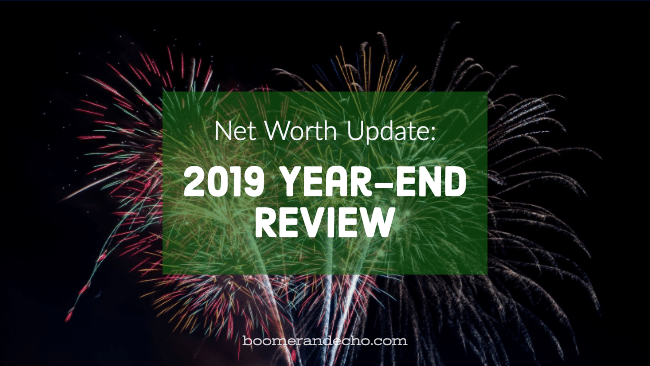
I remember writing last year's net worth recap and being disappointed that I didn't reach my goal after the stock market tanked during the last three months of 2018. What a difference a year makes!
My investments were up 20+ percent this year. We also reached all of our 2019 financial goals, including maxing out my RRSP, contributing $12,000 to my TFSA (to catch up on unused room), maxing out the kids' RESPs, not taking on any new debt, and keeping our epic trip to Scotland and Ireland affordable.
The huge gains in the stock market boosted our overall assets to more than $1,000,000 and pushed us to within a hair of my 2019 net worth target of $830,000. Here's how it all breaks down:
Net worth update: 2019 year-end review
| 2019 | 2018 | 2017 | % Change | |
| Assets | ||||
| Chequing account | $1,500 | $1,500 | $1,500 | — |
| Savings account | $35,000 | $15,000 | $12,500 | 133.33% |
| Defined Benefit Plan | $224,054 | $198,920 | $174,843 | 12.64% |
| RRSP | $208,614 | $162,939 | $162,201 | 28.03% |
| TFSA | $49,239 | $29,378 | $20,327 | 67.61% |
| RESP | $52,754 | $38,472 | $34,442 | 37.12% |
| Principal Residence | $459,000 | $459,000 | $459,000 | — |
| Total assets | $1,030,161 | $905,209 | $864,813 | 12.13% |
| — | ||||
| Debt | ||||
| Mortgage | $201,665 | $213,678 | $225,290 | (5.62%) |
| HELOC | — | — | $3,816 | — |
| Total debt | $201,665 | $213,678 | $229,106 | (5.62%) |
| — | ||||
| Net worth | $828,496 | $691,531 | $635,707 | 21.25% |
A few questions that I often get asked after posting a net worth update:
Credit Cards & Banking
We funnel all of our purchases onto a couple of different rewards credit cards to earn points on our everyday spending.
Our go-to card is the now discontinued Capital One Aspire Travel World Elite MasterCard. We have a grandfathered version that pays 2 percent back on every purchase and comes with a 10,000-point bonus each year.
Our secondary card is the American Express Cobalt Card, which we use at non-Costco grocery stores and on dining and liquor. Finally, we look for the best credit card sign-up bonuses and time our large annual spending (car and house insurance) around these offers.
We each have no-fee chequing accounts at Tangerine, which we use for bill payments, email money transfers, and the odd debit purchase.
The rest of our banking is done at TD, including our mortgage, line of credit, and investments.
Pension
Each month I contribute roughly 13 percent of my salary to a defined benefit pension plan that my employer also matches. The amount listed above is the commuted value of the pension if I were to leave the plan today. <–Update: I quit my job at the end of the year and I'm just awaiting the final valuation of the plan before determining whether I'll keep it in the pension or take the commuted value and invest it in a LIRA.
RRSP / RESP
The right way to calculate net worth is to use the same formula consistently over time to help track and achieve your financial goals.
My preferred method is to list the current value of my RRSP and RESP plans rather than discounting their future value to account for taxes and distributions.
I consider a net worth statement to be a snapshot of your current financial picture, so when it comes time to draw from my RRSP and distribute the RESP to my kids, net worth will decrease accordingly.
Principal Residence
We bought our home in 2011 for $425,000 and developed our basement a few years later, increasing its value to $450,000. The next year I bumped up the market value by 2 percent (which is still less than its city-assessed value), but the local real estate market has since flattened – with nothing selling in our price range – and so I’ve left the value at $459,000 for the past three years.
Final thoughts and a look to 2020
I've had a long-standing goal to reach a net worth of $1M by the end of 2020. I'll need another 20 percent increase in net worth to get there.
One minor wrench in the plan is that I quit my full-time job, and so I'll be relying entirely on income from this blog, freelance writing, and my financial planning service.
I don't see this as a problem so much as an opportunity. Both my salary and career trajectory had stagnated in the public sector, and the next four years of budget cuts look to be brutal. Meanwhile, my side business was growing by leaps and bounds.
Online income surpassed my full-time salary in 2018 and increased by another 30 percent in 2019. And that was with me dedicating just 12-15 hours a week to my online business. Imagine if I put another 10-15 hours a week into it?
That's the plan, anyway. If successful, we'll be able to meet our savings goals, accelerate our mortgage payments, and travel more than ever before. I'm looking forward to the challenge ahead, and to hit that $1M net worth milestone!
How did this year go for you? Did the rising stock market drive your net worth higher? Let me know in the comments below.